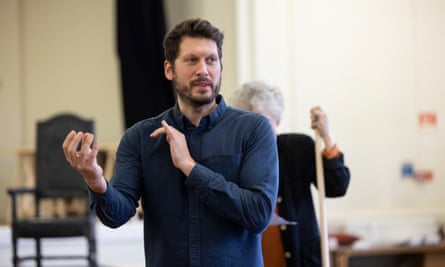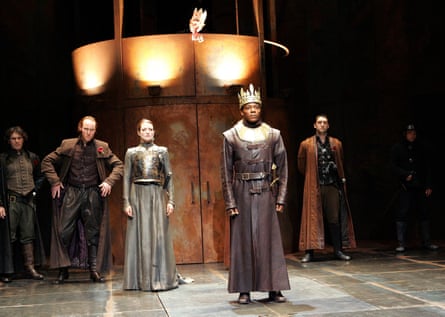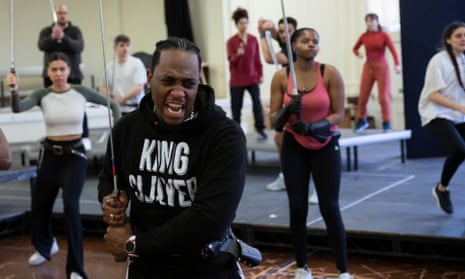I discovered recently that Richard Wagner liked to spend his evenings at home performing scenes from Henry VI. You can see why Shakespeare’s monumental trilogy would appeal to the creator of the Ring cycle. You could also hardly have a starker contrast than Wagner’s solo efforts – “in the face of which,” said his wife, Cosima, “mortals can only be silent” – and the RSC’s upcoming production of Henry VI Parts 2 and 3, which will feature a total cast of 120.
This massive project is in the hands of Owen Horsley, who last year co-directed, with Gregory Doran, a streamed version of Henry VI: Part 1, which broke all the usual rules by allowing viewers access to rehearsals. Meeting Horsley during a lunch break on his epic venture, I was struck by the calm assurance of this Fife-born Scot. And, having spent eight years with Cheek by Jowl and as long working on the RSC history cycle, he clearly knows his Shakespeare.

Of Henry VI, he says: “These plays, whenever they are done – especially at the RSC – invite experimentation. So I’m working with a company of 25 professional actors including eight recent drama school graduates. For Part 2, which we call Henry VI: Rebellion, they will be joined by 74 adults recruited from the length and breadth of England – though, sadly, not Scotland – and 21 young performers from the RSC’s Next Generation company. They will all come together for Jack Cade’s rebellion when there’s a stage direction that says ‘Enter Cade and all his rabblement’.” Although, as Horsley says, there is a sense of scale to these plays, these 95 recruits “aren’t simply there to make up the numbers”. Some will have speaking parts, such as the character of Saunder Simpcox, who lays fraudulent claim to a miracle cure. “One way to experience Shakespeare is to see it,” says Horlsey. “Even better is to be in it. We are offering people the opportunity to connect with Shakespeare and hopefully pass on the joy of that experience to others.”
Horsley’s appetite for experiment doesn’t stop there. He has edited the text so that Act 5 of Part 2 now opens Part 3, forming a sequence of battles aptly titled Wars of the Roses. As if he didn’t have challenges enough, Horsley is also exploring the use of cameras and projected images on stage. “What Shakespeare is interested in,” he says, “is the humanity behind the history. There is a scene where Henry has to decide what to do when the Duchess of Gloucester, his aunt, is accused of treason. We will have a closeup of Mark Quartley as Henry to explore the dilemma he faces in making a judgment. During the battle scenes, we’ll also have cameras on stage taking us into the thick of the conflict. The actors themselves, in medieval costume, will be working the cameras.” When I say that this sounds “very Katie Mitchell”, Horsley laughs and accepts it as a great compliment.

These plays naturally have their own history within the RSC. It was the Peter Hall and John Barton production of The Wars of the Roses, with Peggy Ashcroft and David Warner, that in 1963 shaped the company’s identity. In 2008, along with Richard III, they formed the climax of an eight-play History cycle directed by Michael Boyd. I wondered if Horsley felt intimidated by the weight of the past. “I’ve never seen these plays on stage,” he says, “and I did my edit of the text without checking what others have done. I’ve since gone back and been astonished at how much new material Barton wrote and I loved Michael Boyd’s use of ghosts to show the interaction of past and present. But, as a director, you have to trust your own instincts and remember that you are doing these plays for an audience in 2022. In this industry, comparison is such a waste of energy and time.”
Critics, however, live by comparisons and some will inevitably be made with past RSC glories. But what strikes me is Horsley’s passion for, and acute perceptiveness about, these plays. He points out that the chasm of experience between the high and low-born is pinpointed by a line from the wife of the fraudster, Simpcox, who says “Alas, sir, we did it for pure need”. He also says that on the first day of rehearsals he banned the word “weak” in describing Henry VI, seeing him as a complex man whose indecision stems from a desire to balance competing arguments. And when I ask if it has been unnerving to rehearse these plays at a time of war in eastern Europe, he says that there have been discussions every morning about the day’s news. But he adds that although these plays are all about power, murder and ego, you don’t have to strain to make them seem topical. “I’ve always seen Shakespeare,” he says with a commonsense rare in the age of auteur directors “as allowing the resonances to arrive unaided at the audience’s ear”.
Henry VI: Rebellion opens at the Royal Shakespeare theatre, Stratford, on 1 April and Wars of the Roses on 11 April.

Comments (…)
Sign in or create your Guardian account to join the discussion